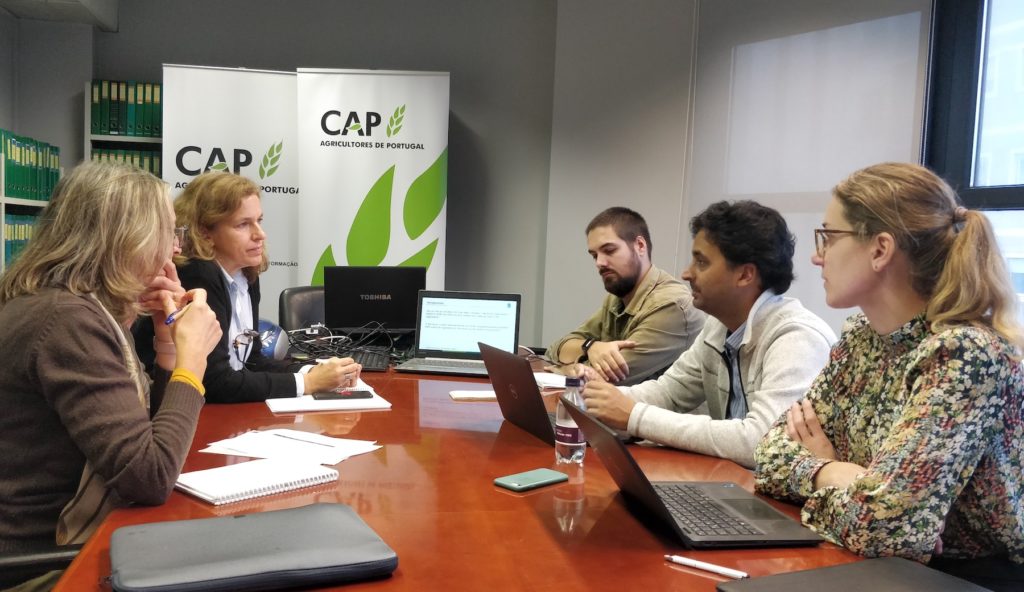In the period 18-21 November 2022, AGREEMAR project partners LNEC and adelphi held bilateral meetings with key stakeholders of the project demo sites in Portugal including the regional office of the Portuguese Environmental Agency in Alentejo (APA), regional water utilities (EDIA and AgdA-AdP) and a farmer union (CAP).
After the project was introduced in a stakeholder workshop in June, the project partners discussed with the stakeholders their role and engagement during the project and beyond, as well as how to best adapt the project objectives to their needs and local circumstances. A main component of the meetings was a participatory exercise in which stakeholders shared their views and rates of criteria for MAR planning.

The results of the meetings have once again shown the importance of engaging stakeholders from the beginning of the project to ensure the development of tailor-made project results and to promote their sustainable use beyond project end. In addition, the personal interaction with the stakeholders generated trust and ownership among them and encouraged for upcoming cooperation. The results will further inform the development of a stakeholder engagement strategy and plan that will be published next year January.
Scope and structure of the meetings
The mission included a total of four bilateral meetings with key stakeholders and a site visit to one of the MAR demo sites in Comporta. When selecting stakeholders for the meetings, care was taken to meet at least one representative from each of the three MAR feasibility thematics, namely: intrinsic site suitability (APA), water demand (CAP) and water availability (EDIA and AgdA-AdP). This is to ensure that the different interests of the stakeholder landscape are covered as well as possible. During the bilateral meetings, key stakeholders were asked about their roles, interests and needs in relation to the project outcomes—including MAR feasibility maps, numerical groundwater models and MAR agreements. The questions inquired, for example, about existing MAR planning processes and related institutions, the conflicts and benefits they see in relation to MAR, and their willingness and ability to engage in the project. The interview was complemented by selected inputs and an interactive exercise in which the stakeholders were asked for their views and ratings of MAR feasibility criteria. This small exercise is part of a stakeholder-adapted weighting approach for mapping the geospatial feasibility of MAR applications developed in the AGREEMAR project (see D2.2 Participative methodology for criteria selection and weighting in MAR site feasibility mapping).
Usage of the results
The stakeholder responses received during the mission will inform the development of tailored project outcomes at each of the four demo sites. Furthermore, the mission forms the basis for a participative creation of a stakeholder engagement strategy and action plan (D1.1 Initial dissemination and communication strategy and plan) that will be published in January 2023.
Main take aways
- The regional department of the River Basin Management Organisation (APA) in Alentejo showed interest in using the MAR feasibility maps that are being co-developed under the project. MAR planning is not yet regulated in Portugal, but given their role and mandate to manage water resources and issue permits for water abstraction and discharge, they see themselve in a crucial role in the planning and commissioning of MAR facilities, as well as in the issuing of MAR site permits. They would be interested in using their in-house GIS expertise to identify the best locations for MAR facilities using the maps themselves. MAR is not yet part of the regional watershed management plan, but according to André Matoso, head of the APA/ARH Alentejo department, MAR will become an important piece of the bigger puzzle in adapting to climate change and combating water scarcity in Portugal.
- At one of the two demo sites of the project, a small MAR plant is already in operation, infiltrating treated wastewater from Comporta. The main objectives of this MAR plant are water storage, advanced treatment and saltwater mitigation. There are no groundwater users in the groundwater flow direction, which makes this site very suitable as a research location. APA is interested in the modelling and research results planned in AGREEMAR to use the site as a showcase for MAR, paving the way for further facilities and increasing the acceptance of MAR for water reuse.
- The water utility AdgA, operator of the treatment plant and MAR demonstration site in Comporta, also expressed great interest in the groundwater modelling results to optimise their MAR site and quantify the resulting benefits. They are not able to produce groundwater models and would therefore rely on the modelling services of LNEC and the project team. In addition, they are interested in mapping the intrinsic site suitability in the areas where they have wastewater facilities to assess the replication potential of the demo site. When selecting suitable MAR sites, criteria such as water demand are rather secondary for them. As a rationale for this assessment, they argue that Portugal as a whole is in a critical situation of water scarcity, which leads to demand following supply.
- CAP, representing the farmers’ interests, also support the development of groundwater models to increase acceptance towards water reuse. Some of the farmers are very active in groundwater monitoring and could assist in data collection. With regard to water supply in general, main concerns of the farmers that have been mentioned included the costs and acceptance of direct water reuse, a strategy that is increasingly promoted with the new water reuse directive. MAR might be an important intermediate solution, promoting indirect water reuse. A major issue for the protection of Portuguese water resources is the use of potable water for irrigation purposes, as identified by stakeholders. MAR, increasing water availability and improving water quality, as well as MAR agreements between the different water user groups, could be useful to better allocate scarce water resources and share the associated benefits. CAP offers to act as a facilitator between farmers and other stakeholders and to support the project team in drafting agreements. They stress that it will be difficult to convince farmers to pay for something whose benefits they cannot immediately see, thereby emphasising the need for smart agreements backed by strong groundwater models to ensure that benefits are fairly distributed and costs are balanced.
